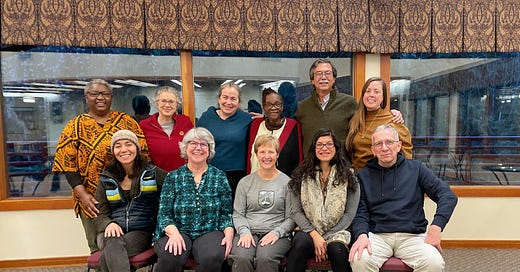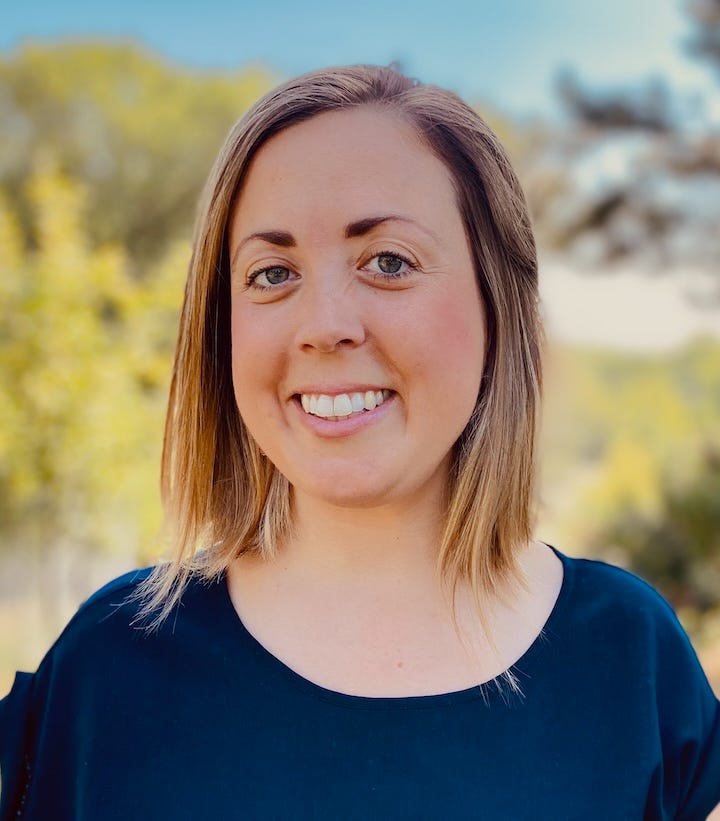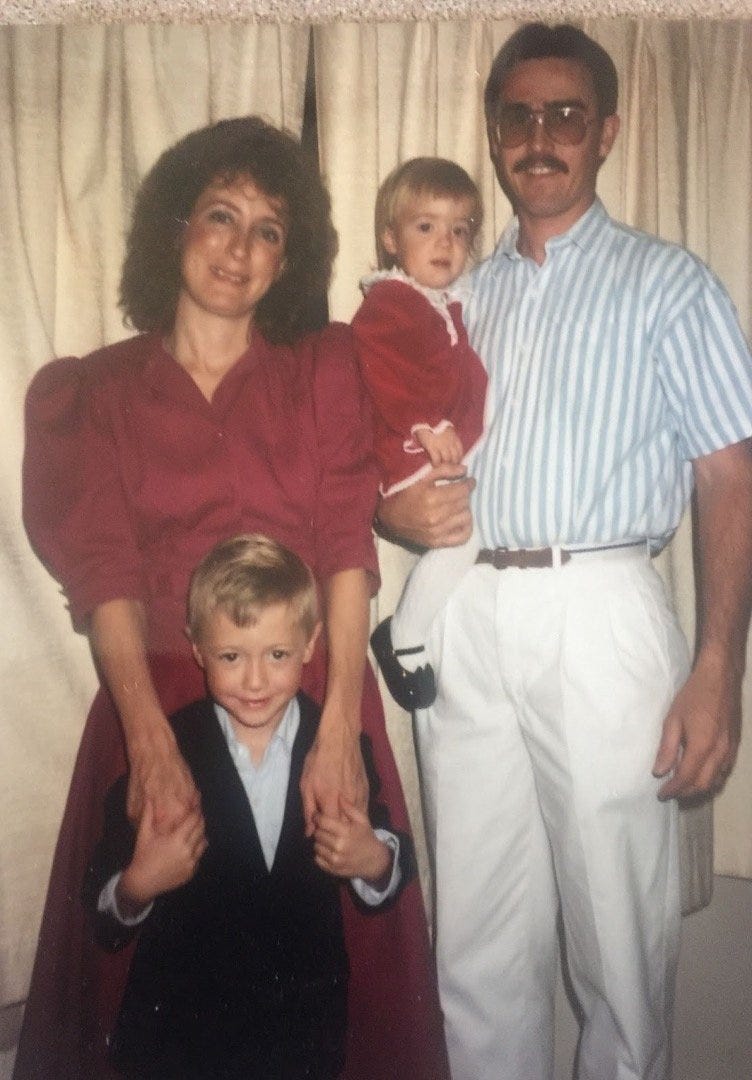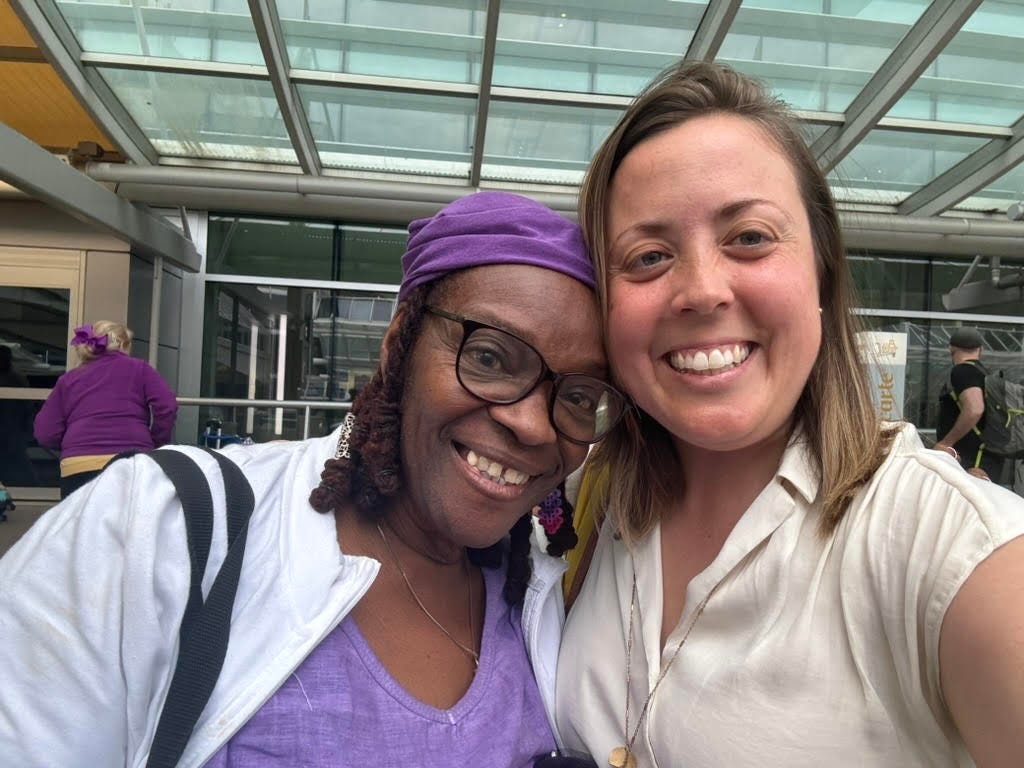Often, in organizing the rich, we can narrowly focus on moving money and undervalue the long-term personal work needed for wealthy people to shift their relationship to the money in their control. This is one of the reasons why I am delighted to share this interview with Sawyer Tracy, a leader in an organization called Wisdom & Money, a spiritual community that helps people of wealth find greater inner and outer alignment of their money with their values.
They bring a spiritual depth and long-term commitment to this work that I really respect. I also just adore people who embrace and embody the revolutionary spirit of Christian liberation theology.1 It’s a wonderful contradiction to the way so many white progressives in my world reject and deny their Christian roots.
I talked to Sawyer last Summer (June 2023) and the transcript has been edited for content and clarity.
MG: How did you get involved in engaging and working with wealthy people for the collective good?
ST: I spent the first five years of my career working in international development on poverty alleviation projects. After my last stint in Kabul, Afghanistan, it was clear to me that the problems that I was trying to solve started in the United States with people who looked a lot like me. Working to address global inequality brought me back to the source of that global inequality, which I would say is the dysregulation of the white American body at this moment in history. Maybe prior to that it's also the European body. So I shifted from more strategic and technical solutions to working on the psychological and spiritual issues that are the basis for how money flows - or doesn’t.
MG: What is your class background and how has it shaped your relationship to this work that you do, particularly engaging people around wealth?
ST: I grew up in a working class community and family in small-town New Mexico. My dad is an electrician and my mother a bookkeeper. I'm a class straddler at this moment, and I think that is true for most of my family's history, too – moving between more elite classes and working class. I’m a white woman, so that means a lot in this world, no matter what class I’m in. I have a lot more education, resources and connections because of the elite world I stumbled into as a young person. At this moment I would say I'm wealthy even though I don't have the dollars that many wealthy people do.
MG: What does that mean to you to say “I'm wealthy”?
ST: It means I have more than I need and there is enough for me to create more in the future. I trust in the abundance of the earth and in the communities that support me. I'm in an interdependent web of wealth; together we have more resources than people who have a lot of dollars. For example, I currently live in a community of 65 people where we have 20 shared cars. Even if I had access to millions of dollars, I don’t think I would have 20 cars to choose to drive each day. The lifestyle that I live is full of luxury: free time, delicious home-cooked food, beloved community, time to make art, reflect, exercise, play, heal, dream, and grow.
MG: How did you get involved in working with wealthy people around money?
ST: I grew up in Carlsbad, New Mexico, a primarily working class community that has become an oil fracking hub since I left. In that context, I didn't think twice about my ambitions – I felt like I could do whatever I wanted if I tried because I was smart and at the top of my class. After high school, I studied abroad for a year in Ecuador, then went to Wellesley College outside of Boston.
To this day, it still shocks me that an elitist world like Wellesley exists. I went there on scholarship thinking, “I'm going to feel so empowered to be in a space with only women and to do things in a much more maternal spirit than what capitalism and white supremacy teach us.” Then I got there and they were like, “No, you can just take over the men's jobs.” And I was like, “What?! That's not what I came here for.” I knew there was a better way. But Western elite culture makes a really strong case, a kind of gaslighting, that it offers the best way.
I struggled. I applied to transfer four out of the eight semesters I was there. But I didn’t have adults in my life who knew how to support me in that decision or the extra money to transfer and lose my scholarship – it would have been a huge financial challenge.
Most of my 20s I spent reckoning with what happened at Wellesley and understanding why it was hard for me to be there. Wrestling with that experience has equipped me to work in worlds that have an elite Western framework while also holding on to what I know is true: we belong to the earth and to each other. If we are not grounded in the natural, humane, and communal, then we will get lost in the ever-innovating propaganda of the American empire.
MG: What would be helpful for others to know about the structure of Wisdom & Money programs and how they work?
ST: I found Wisdom & Money in 2018 while I was co-directing another organization that was supporting white people to reclaim their humanity through deep work within small, committed groups [what some call ‘circle work’]. Wisdom & Money resonated deeply with me because they did their work in long-term circles as well. I attended one of their retreats and learned that their circles had been gathering together for decades. These people understood how deep transformation work happens and I wanted to take part.
Wisdom & Money (we had a different name before this) is an international organization that has been gathering folks for more than 20 years. We work with people of wealth to use money as a doorway to transformation at the personal, communal, and systemic levels. We hold open retreats for newcomers and we sit in open spiritual practice circles about once a month. Anyone who has spent time in our other programs can join a closed circle that meets monthly and gathers 1 to 2 times a year on four-day retreats. I am in the Boston Circle, which is 17 years old and the longest standing circle. I would say, for context, we're not exclusive to older people, but at this moment, most of our network is over 50.
A Wisdom & Money circle is the small group of people you journey with and share everything with: your assets, all your financial numbers, what is of value to you, and what constrictions come up in relation to your money. We are working on very concrete financial questions. For example, “I have these assets. How much do I want to give away before I die? After I die? How do I think about those things?”
We know it takes a long time for internal shifts to happen and resources to flow freely, especially when the resources are held in complex family systems. So we spend decades with people in that shift, not hours or months. Spiritual practices and being in a community of support are essential for this work – and true, deep, trusting community takes a lot of time to build.
We are committed to a practice called the Be Present Empowerment ModelⓇ (BPEM) created by Lillie Allen. This is our approach to supporting people when trauma or difficulty arise. It is helpful especially between group members – when something in your story touches me and I can't hear your story anymore because I'm in mine – then we aren’t in right relationship because I am not truly listening.
Using the Be Present Empowerment ModelⓇ alongside contemplative spiritual practices help us get out of our survival brain and stay in the front of our brain, which is where true kinship and relationship happen. We practice returning to the present to make decisions based in present reality – not personal history. We provide support and a skillful holding of people as they shed their distress and start to live from the fullness of their spirits. This transformation is probably one of the most underrated parts of the money work. I always joke that it's not for lack of information that we're in the situation that we're in. How do we get that information to transform us? That’s the slower work that requires trust, patience, and connection.
We [Wisdom & Money] don’t track the movement of money precisely, but anecdotally we have easily moved tens of millions of dollars, and I’d guess probably more like $100+ million over the course of the last twenty plus years.
MG: Who are your mentors in this work and what do you see as the lineage of the work you're doing around wealth?
ST: I would say my primary mentor is the person of Jesus. I don't know if you know the framework of a “window of tolerance,” but there's this concept that when we're able to stay in the front of our minds, we're in our window of tolerance. And when we leave that window, we experience dysregulation, which often causes harm. So when I think of Jesus, I think of a person who was able to stay in that window of tolerance until his death, even in his horrific death. And he did that in the heart of the Roman Empire under Roman imperial rule as a Jewish man.
MG: So what does that have to do with money?
I feel like it has everything to do with money – that he could see very clearly the oppressive powers of his time and consistently oriented himself towards a different way. Jesus’ story comes in the lineage of the Jewish people’s stories captured in what I call the Old Testament, which are some of the few pre-colonial written stories that tell us how money worked and flowed. So I take a lot from the Christian Scriptures as a guide.
More recently, I think of some of the Catholic greats like the Berrigan brothers and Dorothy Day. And then personally, Chuck Collins has been a dear friend and mentor. Lillie Allen, the founder of Be Present, Inc., has been doing transformative social change work for more than forty years and has had a life-changing impact on me. Pastor Jin S. Kim is the founding pastor of a radical Daoist Christian community in the Twin Cities, that includes the Underground Seminary where I received my Master’s in Divinity. Through the communities they've founded, Lillie and Pastor Jin have helped me know – in an embodied way – an abundance and wealth that is far beyond any kind of financial wealth that I could muster through capitalism.

MG: What are some of the lessons from your work with wealthy people that you want others to know and understand?
ST: The first lesson is that we cannot be led towards a different relationship to money unless we really want it for ourselves.
Shifting our relationship to capitalism, white supremacy, and wealth accumulation can feel painful and threaten our identity, friendships, relationships – even family. If we are not grounded, we will find a million ways to avoid the hard work of change.
But at some point there is a threshold moment for a person when they realize the place we are moving toward is much better than anything we leave behind. That what we know to be true – the joy, spaciousness, ease, connection of moving in alignment with the spirit of life is more powerful than all of the losses and all of the grief we might go through in resisting the world of wealth accumulation. As teachers and leaders in this work, we guard and protect that inner knowing.
There's Christian scripture that says the wealthy will not enter the kingdom of heaven. The reality is neither the wealthy nor the poor are going to enter the kingdom of heaven because there's no inequality there. Status does not exist in heaven. There are just people.
So I see my work as brilliantly good news for wealthy people. The good news is belonging. I understand rich people to be marginalized (on the top margins but nonetheless quite set apart) and they can find their belonging and their inherent humanity when they move toward the center.
And money cannot do that. We know time and time again that money cannot and does not do that.
But the truth is there's no part of me that is coming from justice ideals. I am not working with wealthy people because of some abstract ideal – I am working with people because I myself have been reborn and I want that for everyone who has lost access to their wholeness in these systems set up as separate. I have experienced the relief of becoming human again through the faithful love of my mentors and community. I'm quite evangelical in the sense of wanting to share this good news and better way that I have experienced for myself.
MG: Are there particular stories that you want others to know about this work you do with wealthy people?
ST: Two years ago, I paid off about $71,000 in student debt with the help of my community. On my own, it would have taken ten years, but I wanted financial freedom sooner. I reached out to friends, and they gifted me $43,000, which alongside my own contributions, allowed me to pay off the rest. This experience changed how I viewed debt and money — from seeing it as my individual burden to recognizing the potential joy and connection that comes from shared resources. It also shifted my understanding of money as a tool for interdependence, where we can vulnerably bring our needs to each other and be supported.2
I’ll also say, I strongly support structural change to our economy and the abolition of student debt. My story represents what is possible in the interim – as we organize and build towards that goal.
MG: What are mistakes you've made that you want others to learn from?
ST: I would say I've gone through all of the phases of mistakes, especially as a white woman. I started this journey during my first trip abroad working in the developing world as a young high school “missionary” through my church congregation context, which included a lot of ambition, entitlement, and presumptuousness. Those three are common in white culture and cultures of wealth. Because of all the mistakes I have made, I come to this work with humility. I sit with people and listen with curiosity, reminding myself that I have no idea who someone is until they tell me. And then I believe them when they tell me through their actions and words.
As I mentioned earlier, people have to be ready to shift their idea of wealth and abundance. Another mistake I have made is wanting that shift for other people more than they want it for themselves. While I dream of a transformed world, I hold that differently than I might have as a younger organizer who was trying to force my vision on others.
MG: What do you see as strengths and weaknesses of how wealthy people are currently engaged by progressive movements?
ST: I'm grateful for the shifts I’ve seen in the last ten years to make more space for wealthy people in social movements. You don't have to be in the closet as a rich person anymore. I'm particularly grateful for people like Chuck Collins and groups like the Patriotic Millionaires, who have taken a clear stance and created an identity for wealthy individuals who want to push for change.
It’s important to engage the rich as humans first and foremost, but also as potential allies in the shift towards a better world. My experience with many rich people is that they're demonized. That is not serving anybody. To realize the change we are seeking, we need to distinguish wealthy people from wealth itself and from systems that accumulate wealth; we must disentangle the person from that place that they're holding in our system.
That differentiation is central to the work of Wisdom & Money. We help people of wealth move beyond reacting defensively to accusations that they are part of the problem. Instead, we encourage them to step back and see how the entire system is destroying the life in each of us and our planet. Through our work, I can see wealthy people’s self-perception softening, allowing them to open up and do the inner work required for real change.
When I consider ways our movements could grow, my assessment is that there's not enough maturity and courage right now within progressive spaces to set better terms for our future than the ones we're being offered by the current system. And until we get better terms, we're going to struggle
We cannot start with ideology. We need to start with relationships, with each other. Together. And who knows where we're going to go because we're not starting with the vision first. We're not starting with some abstraction first. We are starting with real people, real needs, real time.
MG: If you could identify two priorities for progressive rich people organizing over the next 5 to 15 years, what would they be?
ST: I want every person who's connected to progressive wealthy organizing movements to know themselves as interwoven with at least ten other humans that will have their back no matter what happens on this planet.3
I want that kind of deep trust and relationship building so folks can call each other when they need to rant about some frustration, and just need someone to listen and show them compassion for 30 seconds – or when they're making big decisions about money coming their way.
I want no one in this movement to be rooted in individualism in any way. I want each of us to have communities of deep support, love, and joy that inform what we are doing with the wealth that we share. Communities like Black Wall Street in Tulsa, that oasis of wealth and connection and resource for Black people, which was a huge threat to white supremacy and capitalism.
MG: Your answer leads well into my last big picture question. What is your 150 year vision of success in this work?
ST: I imagine a locally based economy where we are more like villagers to each other than we are citizens of some abstract nation. I imagine the softness of people's bodies in a world where there's not anxiety about whether there's enough for me or my children to eat dinner, or anxiety about whether someone wants my money. The softness of bodies that haven’t had to sustain oppression. I imagine a world without the layers of self-consciousness. A world where our minds are whole and not split, where our minds are deeply integrated with our bodies and emotions. And from that place of abundance – I imagine it being a really wonderful way to be human.
In 150 years, I’m hopeful we could reset the flow of resources with each other and return to our proper place in the universe, not as the supremacists at the top of the system, but as the littlest sibling – the most recent to evolve.
—----------
Thank you Sawyer!
What did you think? What ideas or questions are you taking with you from this interview? I’d love to know.
Thanks to Sawyer, Lea Park, and Allison Harrison for your help editing this piece.
Liberation theologies affirm that faith addresses the whole of personal and social life. Thus they necessarily address the political and social systems that obstruct justice and reconciliation, seeking to transform them into social and political patterns that foster just relationships. See Gustavo Gutierrez's classic: A Theology of Liberation: History, Politics and Salvation (1971).
To read more about Sawyer’s experiment paying off her debt, check out her blog posts on the experience at the Wisdom & Money website, here.
I recently was inspired to learn of the Moai - a tradition of the Okinawin people in Japan. “The term originated hundreds of years ago as a means of a village’s financial support system…Today the idea has expanded to become more of a social support network, a cultural tradition for built-in companionship. In small neighborhoods across Okinawa, friends “meet for a common purpose” (sometimes daily and sometimes a couple days a week) to gossip, experience life, and to share advice and even financial assistance when needed. They call these groups their Moai.” Read more about the Moai here. Sawyer’s comment reminded me of this practice and its immense benefits.








Such a pleasure to work with you on this! I'm grateful to have the opportunity to share some of my story and some of my work with you and your readers!